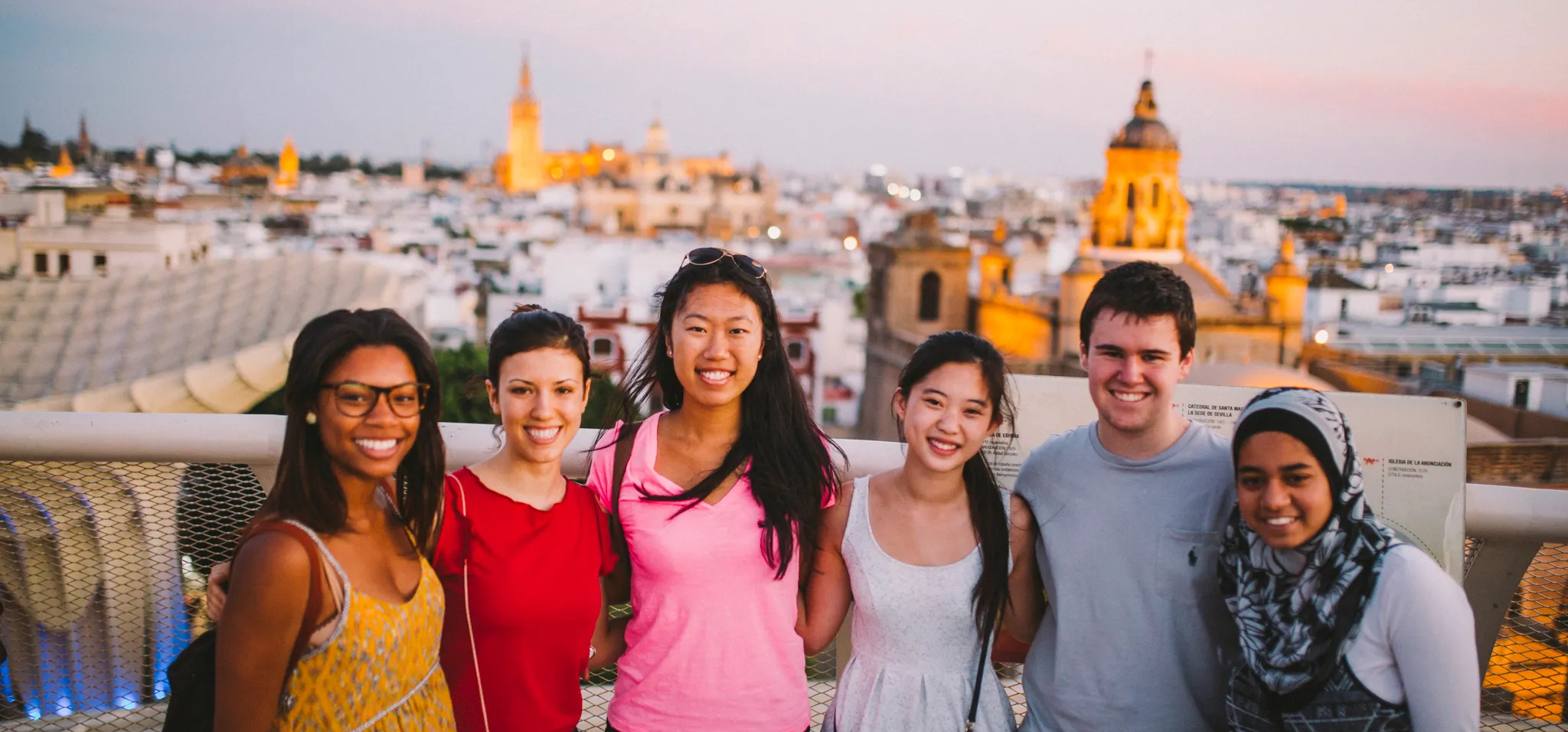
Identity Abroad
Each student has special intersecting identities that give them a unique perspective and view of themselves and their relationship to the world around them. Students interested in studying abroad are encouraged to learn about how these different aspects of their identity may interplay in new environments while visiting their host countries.
Explore the various on-campus and international resources and opportunities for students interested in understanding their identities abroad:
First Time Travelers
Your first time traveling internationally can be overwhelming. However, a student who takes the time to research their host country and culture and is open-minded about their travels will be able to have a transformative first experience.
Questions to Keep in Mind
- Do I have a passport? Does my passport need to my renewed before my trip?
- Am I familiar with my program’s itinerary? Do I have appropriate contact at home and abroad in case of an emergency?
- What are the cultural traditions of the country I will be visiting? Is there an official language that I may not know and should familiarize myself with?
Campus & International Resources
- Apply or Renew your passport through the U.S. Department of State - Passport Hub.
- Rustic Pathways provides a 6-chapter guide for first-time student travelers and their families, including information such as choosing a travel destination and what to pack.
- The U.S. Department of State offers a Traveler's Checklist, which provides information about destination countries and what documents they may require. The site also provides guidance on getting into contact with a country’s U.S. Embassy if it is needed during your program.
- Click here for the Office of International Program's list of frequently asked questions.
Gender
Different cultures around the world maintain different perspectives and attribute different roles towards gender. How you are treated and perceived based on your gender may greatly vary from your experiences at home. Your host country's culture may impact how you travel locally, how you may dress, and your interactions with the local community. It is important to research extensively how your gender identity is treated within your host country, and if there are certain laws or social norms that you should be aware of before traveling abroad.
It is important to identify resources within your program that may assist you in dealing with situations of sexual assault and sexual harassment.
Questions to Keep in Mind
- What are the gender roles promoted within my host country? How do they vary from my experiences within the United States?
- How are men and women and their relationship dynamics perceived within my host country? What are considered the appropriate forms of dress for both genders?
- What is the local culture guiding the interactions between men and women? How can women effectively respond to unwarranted advances?
- What resources are available to me as a member of a certain gender identity abroad? Do I have accessible support and a ‘buddy system’ when going out within my host country?
Campus & International Resources
- Seton Hall's KNOW MORE Peer Educators consist of a group of undergraduate students who educate and offer resources to the Seton Hall community regarding alcohol use and sexual violence prevention and intervention.
- The U.S. Department of State provides an all-encompassing list of considerations for women to keep in mind while traveling abroad. Click here to view the site.
- StudyAbroad.com offers tips for female students traveling abroad, including having an awareness towards safety concerns in a new culture.
- Transitions Abroad provides a guide for staying healthy and avoiding certain illnesses, as well as advice for women's health issues here.
- AU Abroad offers male students interested in the study abroad experience various considerations to keep in mind.
Race & Ethnicity
Race and ethnicity play varying roles in cultures throughout the world. While you are in your host country, you may find yourself perceived as a part of an ethnic minority or majority, which you may have never experienced before. You may be assigned to a certain ethnic group solely based on your appearance; if you have ethnic roots within a host country, you may experience different norms and treatment based on this identity, rather than your national identity.
Questions to Keep in Mind
- What ethnic and racial groups are considered the minorities and majorities within my host country?
- What are the local laws regarding racial and ethnic discrimination?
- What norms and perceptions surround my ethnic group within my host country? What stereotypes are perpetuated about my group?
Campus Resources
- Black Student Union aims to promote unity among the Black students of Seton Hall through educational and cultural opportunities, as well as community outreach in facing oppression both on campus and abroad.
- South Asian Student Association is an inclusive organization that aims to promote South Asian culture with various events to students of all background at Seton Hall.
- Adelante Student Organization works to empower and encourage the Latinx community at Seton Hall, providing awareness through community service and event opportunities.
- Filipino League at Seton Hall is a cultural student organization aiming to educate about Filipino culture through multicultural events inside and outside the University.
- Armenian Student Association serves to educate and promote awareness in the Seton Hall community about Armenian culture through social and educational events.
- Pirates of Irish Persuasion and Extraction offers Seton Hall students an opportunity to learn more about Irish and Irish American culture and traditions.
International Resources
Black or African American Students
- Diversity Network's Black Student's Guide to Global Programs provides a guide to black students interested in studying abroad, covering topics such as having a support network, choosing a program, and staying safe and healthy while abroad.
- The New York Times features a piece by Farai Chideya (Traveling While Black) regarding her personal experiences during her travels around the world.
Asian or Asian American Students
- Cayla Lee, a recent Harvard graduate, shares her experiences traveling to Serbia and South Africa as an Asian American woman.
- Dia Jin recounts her experiences facing the question of "But where are you really from?" while traveling to different countries as a Chinese immigrant to the United States.
Latinx or Hispanic Students
- IES Abroad provides Latinx student testimonials regarding their study abroad experiences, debunking certain myths about being Latinx student interested in travelling.
- The University of Wisconsin-Madison offers more questions and considerations for Latinx students interested in travelling for their studies to consider, including thoughts about colorism, cultural backgrounds, and family involvement.
Religion and Spirituality
Religion and spirituality are deeply rooted in the cultures of countries around the world. Some host countries may have a distinct separation between church and state, while others may have a state religion that is deeply intertwined with their laws and culture. Throughout your travels, you may also interact with individuals with varying religious and spiritual beliefs. Researching your host country's primary religions and spiritual beliefs will help you to better understand the culture and nuanced interactions you will experience.
Questions to Keep in Mind
- What is the dominant religion within my host country?
- What roles does religion play within the local laws and culture?
- Do I intend to practice my faith while visiting my host country? How may I continue my religious and spiritual practices while abroad?
- Do I need any accommodations to continue practicing my faith while abroad?
Campus Resources
- Seton Hall's Division of Volunteer Efforts promotes the University's awareness of social injustice, providing students opportunities to act in Christ’s example through community service, motivated by faith and morality.
- Seton Hall's Campus Ministry aims to encourage students to be a part of the Catholic Church's community on campus, encouraging spiritual and liturgical growth and conscientious social interactions.
- Hillel Student Organization aims to provide a strong community for Jewish students attending Seton Hall, aiming to provide inclusive religious and cultural events and opportunities to foster greater connection at the University.
- Muslim Student Association aims to promote educated dialogue about Islamic culture in the Seton Hall community.
International Resources
- The U.S. Department of State releases a yearly report to Congress on International Religious Freedom; this report details the status of religious freedom and any withstanding policies violating religious freedom throughout the world.
- Brown University provides a comprehensive directory of international resources for different religious and spiritual groups.
- Created by Rutgers graduate Ifrah Akhtar, Muslim Abroad offers an all-encompassing guide for Muslim students interested in studying abroad.
LGBT+
Whether you openly identify as gay, bisexual, lesbian, transgender, or queer, or are still figuring out your identity, it is important to be informed about your host country’s political and social climate and culture regarding the LGBT+ community. Your destination’s policies and interactions may be different from the culture of the United States. It is helpful to educate yourself about the local laws and attitudes about queer individuals and their relationships prior to your travels.
Questions to Keep in Mind
- What laws does my host country have concerning same-sex behavior and gender identity?
- Does the culture of my host country make it comfortable and safe for me to come out? Do I have a support network accessible to me while I’m abroad?
- Is there an LGBT+ community present within my host country? What is the culture and visibility surrounding the community like?
Campus & International Resources
- Seton Hall Pride strives to promote and support the LGBT+ community at Seton Hall University with educational and enjoyable programming. Discord invite can be found here.
- Rainbow Sig provides counseling to study abroad and international students that identify as queer.
- Diversity Abroad provides Destination Guides to educate students about their host countries as well as provide advice about being a queer study abroad student.
- Trans Equality provides guidance for transgender student travelers about what to expect with airport security protocols.
- The U.S. Department of State provides a comprehensive list of things to consider before and during study abroad programs.
These resources are inspired by Cardinal Tobin’s call for protecting and supporting LGBT youth in the Archdiocese of Newark and beyond.
Accessibility
Students with health concerns or disabilities are encouraged to communicate with the Office of Disability Support Services (DSS) regarding their interest in studying abroad. Collaborating with DSS to identify what accommodations and programs are suitable for them will provide the accessibility needed to have fun and successful experiences in their host countries.
Questions to Keep in Mind
- Does the program I have in mind provide the certain accessible accommodations I may need in order to have a fulfilling and well-rounded study abroad experience?
- What are the physical surroundings like in my host country? Are there any accommodations I need in order to move around with ease – and what programs will provide me that?
- Are there certain aspects regarding my health and safety that I should be prepared to adjust while studying abroad?
- These include dietary habits, any food or environmental allergies, language differences, sensory overwhelm, etc.
Campus Resources
- Seton Hall’s Office of International Programs works alongside students, their study abroad program of choice, and Please click here to submit your accommodations request for studying abroad with DSS.
- The RISE Program at Seton Hall University guides low-income, first-generation, and students with disabilities throughout their college career with academic and social support.
International Resources
- Mobility International USA provides information for student travelers with disabilities regarding their study abroad experience, including maintaining health coverage and finding suitable programs.
- Transitions Abroad provides a selection of accounts and recommended organizations written by travelers with disabilities.
- The U.S. Department of State offers advice and guidance for those traveling with disabilities to consider before departing to their host countries


